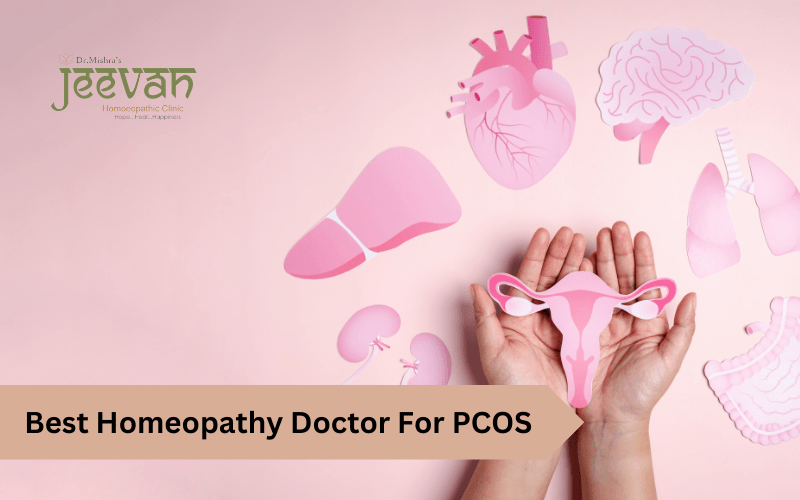Introduction
Polycystic Ovarian Disease (PCOD) and Polycystic Ovary Syndrome (PCOS) are often confused, but they represent different conditions with distinct symptoms and treatments. PCOD is primarily about ovarian cysts, while PCOS involves a complex interplay of hormonal and metabolic issues. For those seeking natural and personalized treatment options, homoeopathy presents a promising approach. This article explores the differences between PCOD and PCOS, the role of homoeopathy, and highlights the expertise of the Best Homeopathy Doctor For PCOS In Pune at Jeevan Homoeopathic Clinic.
About PCOD and PCOS
PCOD and PCOS are both conditions affecting ovarian function but differ in severity and impact. PCOD involves multiple small cysts on the ovaries and can often be managed with lifestyle changes. In contrast, PCOS is a more severe syndrome affecting hormonal balance, metabolism, and overall health. PCOS is linked to insulin resistance and can increase the risk of diabetes and heart disease, requiring more comprehensive treatment strategies.
Understanding PCOD and PCOS
PCOD, or Polycystic Ovarian Disease, involves the formation of multiple cysts in the ovaries, which may cause irregular menstrual cycles and excess hair growth. It is generally less severe and primarily affects reproductive health. PCOS, or Polycystic Ovary Syndrome, is a more complex disorder that includes multiple cysts, hormonal imbalances, insulin resistance, and potential metabolic issues. PCOS impacts various aspects of health, including fertility, weight, and cardiovascular risk.
Key Differences Between PCOD and PCOS
- Hormonal Imbalance: PCOS is typically associated with a significant hormonal imbalance affecting multiple systems in the body, while PCOD primarily involves ovarian cysts and may not always be accompanied by metabolic disturbances.
- Symptoms: While both conditions share some common symptoms, such as irregular periods and acne, PCOS is more likely to be associated with weight gain, diabetes, and fertility issues. PCOD symptoms are often less severe and may not include the systemic problems seen in PCOS.
- Metabolic Impact: PCOS is known for its impact on metabolism, including insulin resistance, whereas PCOD’s effects are usually confined to reproductive health.
Do Homeopathic Medicines Work?
Homoeopathic medicine uses highly diluted substances to stimulate the body’s natural healing processes. For conditions like PCOD and PCOS, homoeopathy aims to address underlying hormonal imbalances and improve overall health. While scientific evidence on homoeopathy’s effectiveness varies, many individuals report positive outcomes from tailored remedies that align with their specific symptoms and health profiles.
Can PCOD Convert into PCOS?
While PCOD and PCOS are distinct, untreated PCOD can potentially evolve into PCOS, particularly if it involves significant hormonal imbalances or metabolic issues. Monitoring and managing PCOD with appropriate medical advice can help prevent progression to PCOS. Regular check-ups and a proactive treatment approach are essential to manage symptoms and reduce the risk of transitioning to PCOS.
Which is More Serious, PCOS or PCOD?
PCOS is generally considered more serious than PCOD due to its wider range of health impacts. PCOS involves significant hormonal imbalances, insulin resistance, and an increased risk of conditions such as diabetes and heart disease. In contrast, PCOD mainly affects ovarian function and is typically less complex, although it still requires appropriate management to avoid complications.
How to Remove PCOD Problems?
Managing PCOD effectively involves a combination of lifestyle changes, such as a balanced diet and regular exercise, and medical treatments. Medications may be used to regulate menstrual cycles and address symptoms. Homeopathy can also be a supportive option, offering personalized remedies to address hormonal imbalances and improve overall health, often in conjunction with conventional treatments.
How Does Homeopathy Help PCOD?
Homeopathy aims to treat PCOD by focusing on the individual’s unique symptoms and overall health. Remedies are selected based on specific symptoms and are designed to balance hormonal levels and improve well-being. Homeopathy can complement conventional treatments, offering a holistic approach to managing PCOD by addressing both physical symptoms and underlying imbalances.
How Do You Treat PCOD Permanently?
There is no permanent cure for PCOD, but symptoms can be managed effectively with a combination of lifestyle changes, medications, and holistic treatments. Homeopathy can play a role in treating PCOD by providing personalized remedies that address the root causes of the condition. Regular monitoring and a comprehensive treatment plan are essential for long-term management and symptom relief.
Conclusion
Understanding the distinctions between PCOD and PCOS is crucial for effective treatment. While PCOD involves primarily ovarian cysts, PCOS encompasses a broader range of hormonal and metabolic issues. Homeopathy offers a tailored approach to managing these conditions, with the expertise of the Best Homeopathy Doctor For PCOS In Pune at Jeevan Homoeopathic Clinic providing valuable support. Combining homoeopathic and conventional treatments can lead to improved health outcomes and better management of both PCOD and PCOS.

